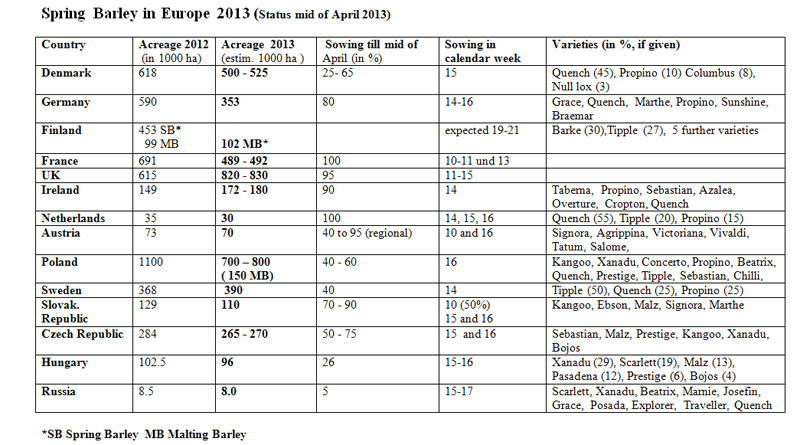Late sowing of spring barley could diminish the yield
The cultivation of spring barley is turning out irregularly this year. In Germany, France and Denmark it is decreasing. Only Great Britain has enlarged its acreage. In almost every growing area it was sowed late. Losses of yield are expected.
As a rule, the most significant limitations in cultivation are happening in those countries where cultivation was significantly extended in 2012 due to winterkills. In Germany, for instance, the long-term negative trend of acreage development is continuing, according to Braugerstengemeinschaft e.V., despite a remarkable malting barley bonus. The expected spring barley acreage, which is currently about 350 000 hectares, will be 15 percent smaller than in 2011. The soil was only belatedly able to dry and be driven on due to prolonged, partly closed snow cover.
At the time of sowing there were reports at regional level about very cold soils and not always ideal soil conditions. Denmark explains the decline of cultivation by a mild autumn and a therefore higher proportion of winter wheat. The delay in sowing of at least two weeks leads to expectations of a loss of yield of about ten percent, due to a shorter vegetation period. Delayed sowings are also expected in Sweden and Finland.
In France there is a sowing of 489 000 – 492 000 hectare, which is less than the five-year average of 520 000 to 540 000 hectare. The yield is not expected to be less than in former years, but there might be a smaller proportion of malting barley.
The adverse weather conditions of last autumn in turn have lead to an acreage increase of spring sowing this year in Great Britain. The sowing took place about one month later than last year. Also in Ireland the acreage was extended by about 15 to 20 percent. The consequences of the delay remain to be seen.
The estimated acreage in Austria of 70 000 hectares seems to be insecure. Attractive prices make maize play an important role as a competitor. The delays in sowing of several weeks are regarded as a negative factor. The decrease of cultivation in Poland is explained by a bigger and more profitable cultivation of winter sowing. Due to the three week delay in sowing, a lower yield is expected.
In addition, in Slovakia, the Czech Republic and Hungary lower yields are expected due to the late sowing. At regional level they go up to five weeks. The vegetation period will be very short. In the areas of delayed cultivation Maize and sunflowers could play an important role as competitors.
The European malting barley market has reacted to the sowing and the mostly better weather conditions. Prices have decreased. Franco „Upper Rhine“ prices of 248 – 250 EUR/t are mentioned for October 2013. A price of 255 EUR cannot be realized any longer.
The bonus for feed barley went from 55 EUR/t at the top down to 40 EUR/t. Market participants suppose that it could decrease to 35 EUR/t. Fob Mosel prices decreased as well at least 10 EUR/t down to 233 EUR. Danish barley could be worth 224 – 225 EUR/t fob Denmark in October. 233 EUR might have been possible some days ago. English barley is offered fob UK with 223 EUR/t.
Besides the conditions for the sowing of maize in the US, the weather will determine prices in the next weeks. From a current point of view this year’s balance in Europe could become difficult.

